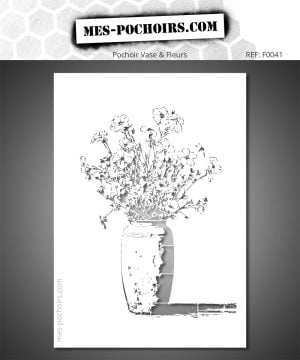Master stencil painting: choice of paint, techniques and tips for impeccable results

Would you like to create a decoration project using stencils? Great idea! But do you know what type of paint to choose to get the perfect result? In this article, we take a look at the different types of paint suitable for stencil painting, how to choose the best paint for your project, and a few techniques for making a success of your creation. So, ready to become a stencil painting expert?
The different types of paint for stencilling
There are several types of paint you can use for stencilling. Each has its advantages and disadvantages, and it's important to choose the one that best suits your project.
Acrylic paints
Acrylic paints are water-based and quick-drying. They are easy to use, non-toxic and available in a wide range of colours. What's more, they can be diluted with water to achieve the desired consistency. Acrylic paints are ideal for stencilling projects on paper, canvas, wood or metal.
Spray Paints
Aerosol paints are very practical for stencilling projects, as they can be applied quickly and evenly. They are ideal for larger surfaces or complex designs. However, it's important to ventilate the work area well and wear a protective mask when using spray paints. If you'd like to find out more about the best spray paint cans for your interior projects, check out our new article : The best spray paints for interiors: advice and recommendations.
Oil paintings
Oil paints have a thicker consistency than acrylics and dry slowly. They give a smoother, glossier finish, but can be more difficult for beginners to handle. Oil paints are recommended for stencilling projects on canvas or on surfaces requiring a tough, durable finish. We recommend acrylic paint, especially if you're a beginner.
Chalk paintings
Chalk paints are very opaque and have a matt finish. They are perfect for interior decoration projects, especially on furniture and walls. They adhere well to porous surfaces and dry quickly. Chalk paints are easy to apply with a stencil and give an aged, authentic look.
Choosing the right paint for your stencil project
Now that you know the main types of paint for stencilling, here's some advice on choosing the one that's best suited to your project.
Take account of the substrate
The type of surface you are going to paint on will greatly influence your choice of paint. For example, acrylic paints are suitable for a wide variety of surfaces, while chalk paints are more suited to porous surfaces.
Considering usage
Think about how you will use your work. If you're working on an object that will be handled frequently or exposed to the elements, opt for a resistant, durable paint, such as oil paint.
Taking account of environmental constraints
Some paints, such as aerosols, can be harmful to the environment and your health. Make sure you choose a paint that is suited to your workplace and environmental constraints. There are now odourless aerosol paints that are much more pleasant to use indoors.
Techniques for successful stencil painting
To achieve impeccable results, it's essential to master a few basic techniques. Here are a few tips for successful stencil painting.
Preparing the substrate
Before starting, carefully clean and degrease the surface to be painted. If necessary, lightly sand the surface to make it easier for the paint to adhere. Then apply an undercoat suitable for the type of paint you are going to use.
The choice of brush
The choice of brush is crucial to achieving a clean, precise result. Use a brush with short, hard bristles, or a special stencil brush. Make sure it's clean and dry before you start.
Applying the paint
To apply the paint, use the "tapping" technique. Dip your brush in the paint, then wipe off any excess on a piece of paper or fabric. Then tap the paint onto the stencil using small vertical strokes. Don't overload your brush with paint to avoid smudges.
Drying and finishing
Leave the paint to dry before carefully removing the stencil. If you want to apply several coats, wait for the first coat to dry completely before applying the next. Finally, you can add a coat of protective varnish to extend the life of your work.
Tips For Clean Edges
To prevent the paint from slipping under the stencil and get clean, precise lines, you can weight down the edges of the stencil with small weights such as metal washers. John also recommends using the tip of a paintbrush to hold the stencil in place during application. Another effective method is to use magnets, especially if you're working on a vertical surface.
Tips for an Authentic Street Art Effect
On the other hand, if you prefer the raw, spontaneous aspect of street art, you can take a different approach. To capture the essence of a quickly produced work, don't weight down the stencil. This technique allows a little paint to get under the edges, creating less defined contours reminiscent of hastily produced street art on urban walls. This slight blurring adds a touch of spontaneity and authenticity, evoking creations made on the spot.
Conclusion
La stencil painting is an artistic technique that offers many possibilities for personalising and decorating your home. By choosing the right type of paint and mastering a few basic techniques, you can produce some superb creations. Don't hesitate to experiment with different types of paint and media to find the style that suits you best.
FAQs
Can I use several types of paint for the same stencil project?
Yes, you can combine different types of paint to create varied and interesting effects. Just make sure you respect the drying times between each application.
How do I clean a stencil after using it?
To clean a stencil, use warm water and mild soap. Scrub gently with a toothbrush or sponge to remove any paint residue, then rinse and leave to air dry.
How can I avoid smudges when stencilling?
To avoid smudges, don't use too much paint and tap rather than sweep. You can also secure the stencil with adhesive tape to prevent it from moving while the paint is being applied.
an undercoat before stencilling?
We recommend that you apply an undercoat suited to the type of paint and surface you are going to use. The undercoat improves the paint's adhesion and gives a more uniform finish. However, in some cases, such as with chalk paints on porous surfaces, an undercoat is not always necessary.
How long does stencil paint last?
The lifespan of a stencil painting depends on the type of paint used, the substrate and the conditions of exposure. In general, acrylic and oil paints are more resistant and durable than chalk paints. To prolong the life of your work, apply a coat of protective varnish after the paint has dried completely.
Our latest stencils
-
New!
-
New!
-
New!
-
New!
-
New!
-
New!
Visit our online stencil shop for even more creativity
To bring your decorating and art projects to life, visit our online shop dedicated to stencils. You'll find a wide choice of designs and styles to suit all tastes and abilities. Whether you're an amateur or a professional, our selection of stencils will enable you to create unique, personalised works of art. What's more, our team of experts is on hand to advise you and guide you through your purchases. So don't wait any longer and give your imagination free rein by exploring our universe dedicated to stencil painting!


























